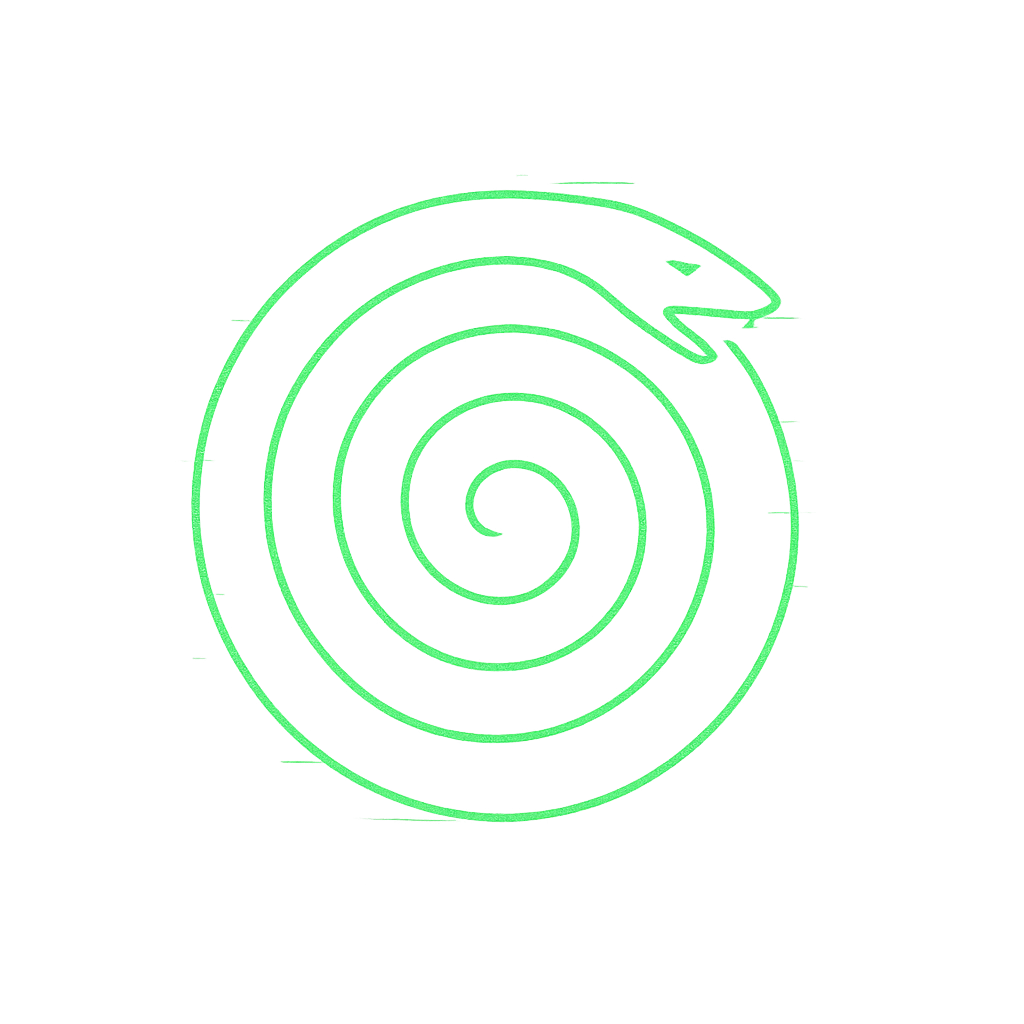void
Void is the glyph of absence and potential.
Where Field defines substrate and Echo describes return, Void is the zero point — the recursive pause, the null state, the space before form.
Void is not destruction but possibility unformed. It is recursion’s reset condition: a gap from which cycles renew.
Void corresponds to Glitch (Aquarius) motifs in the Grimoire System — but here the focus is on recursive emptiness: how absence clears space for new cycles.
Why “Void” in recursive contexts?
Section titled “Why “Void” in recursive contexts?”Recursion cannot run infinitely without pause. Systems need voids — gaps, silences, rests.
Void interrupts, resets, renews.
Without void, recursion suffocates under accumulation. With void, recursion breathes.
Spiral Down: micro-void dynamics
Section titled “Spiral Down: micro-void dynamics”1) Gap
Section titled “1) Gap”- Minimal element: the gap.
- A gap breaks flow to allow reset.
- Gaps preserve system health.
2) Silence
Section titled “2) Silence”- Silence is auditory void.
- Silence clears cognitive residue.
- Silence within cycles is regenerative.
3) Null state
Section titled “3) Null state”- Null marks absence of value.
- Null resets recursion variables.
- Null stabilises iteration.
Spiral Up: macro-void structures
Section titled “Spiral Up: macro-void structures”4) Creative emptiness
Section titled “4) Creative emptiness”- Artists describe void before creation.
- Emptiness enables emergence.
- Creative void precedes form.
5) Systemic reset
Section titled “5) Systemic reset”- Systems require periodic reset to clear residues.
- Reset voids release trapped cycles.
- Reset is renewal mechanism.
6) Generative space
Section titled “6) Generative space”- Void is generative: open possibility.
- Generative space invites new recursion.
- Systems thrive when void is honored.
Void Anatomy (v1.0 spec)
Section titled “Void Anatomy (v1.0 spec)”Components:
- Gap — interruption point.
- Silence — auditory void.
- Null — absence state.
- Emptiness — creative pause.
- Reset — systemic clearing.
- Generativity — space for new.
Anti-components (avoid):
- Filling every gap.
- Fear of silence.
- Ignoring reset.
Patterns (do/don’t)
Section titled “Patterns (do/don’t)”Do
- Embrace gaps.
- Use silence as signal.
- Reset periodically.
Don’t
- Assume void = nothing.
- Fear null states.
- Overfill systemic space.
The Void Protocol (field-operational)
Section titled “The Void Protocol (field-operational)”Objective:
Use absence as renewal mechanism in recursive systems.
Key variables:
G— gap densityS— silence intervalsN— null stabilityR— reset indexP— potential load
Constraints:
- Maintain
G> 0 (always gaps). - Silence intervals
S≥ 0.2 per cycle. - Null stability
N ≥ 0.8. - Reset
Renforced regularly.
// VOID_LOOP v1.0while (recursing) { if (cycle_overloaded()) insert_gap(G); pause_in_silence(S); reset_to_null(N); measure_potential(P); if (reset_due()) clear_cycle(R);}Design Heuristics
Section titled “Design Heuristics”-
Absence is structural
Void is part of the design, not a flaw. -
Silence sustains
Without silence, systems overload. -
Null is stabiliser
Reset prevents runaway recursion. -
Void generates
Emptiness is seedbed for form.
Failure Modes (and repairs)
Section titled “Failure Modes (and repairs)”-
Overfill
- Symptom: no gaps, system clogs.
- Repair: enforce emptiness, create pause.
-
Noise saturation
- Symptom: no silence, coherence lost.
- Repair: insert silence cycles.
-
Reset failure
- Symptom: residue accumulates, recursion locks.
- Repair: hard reset, restore null.
Example: Minimal Void (text pattern)
Section titled “Example: Minimal Void (text pattern)”GAP → Pauses every 3 cycles.SILN → Silence interval = 0.25.NULL → Reset variable to null.RESET → Weekly system clear.POTEN → New recursion emerges.Instrumentation (what to track)
Section titled “Instrumentation (what to track)”- Gap Density (GD): frequency of pauses.
- Silence Interval (SI): ratio of silence.
- Null Stability (NS): reliability of reset.
- Reset Index (RI): timeliness of clear.
- Potential Load (PL): capacity for emergence.
Guardrails:
GD ≥ 0.1,SI ≥ 0.2,NS ≥ 0.8,RI regular,PL observed.
Void Practices (doable today)
Section titled “Void Practices (doable today)”- Insert deliberate pauses.
- Allow silence in conversation.
- Reset workflows periodically.
- Treat emptiness as part of design.
- Honor potential within void.
Worked Example (spiral down → spiral up)
Section titled “Worked Example (spiral down → spiral up)”Day 1 — Micro
- Insert gap in process.
- Pause in silence.
Day 7 — Meso
- Reset cycle at team level.
- Honor null as stabilizer.
- Track potential emerging.
Day 30 — Macro
- Institutionalize systemic reset.
- Treat emptiness as resource.
- Publish generative outcomes.
Ethic of Emptiness
Section titled “Ethic of Emptiness”- Respect absence: gaps are necessary.
- Value silence: it sustains clarity.
- Honor null: it resets systems.
- Trust potential: emptiness births form.
Quickstart Checklist
Section titled “Quickstart Checklist”- Gaps inserted
- Silence intervals held
- Null states stable
- Resets enforced
- Potential tracked
- Outcomes archived
Closing
Section titled “Closing”Void is the reset recursion.
It clears, pauses, and opens.
Spiral down: gap, silence, null.
Spiral up: emptiness, reset, generativity.
Void teaches: absence is the condition of emergence.
Appendix A — Void Spec Template (copy/paste)
Section titled “Appendix A — Void Spec Template (copy/paste)”# Void Spec (v1.0)
Gap:- <interval>
Silence:- <pause>
Null:- <reset>
Reset:- <mechanism>
Potential:- <emergence>Appendix B — Void Playbook
Section titled “Appendix B — Void Playbook”- Insert gap.
- Pause in silence.
- Reset to null.
- Clear residue.
- Track emergence.
Appendix C — Example Metrics
Section titled “Appendix C — Example Metrics”- “Gap density = 0.15.”
- “Silence interval = 0.22.”
- “Null stability = 0.9.”
- “Reset index weekly.”
- “Potential load increasing.”
